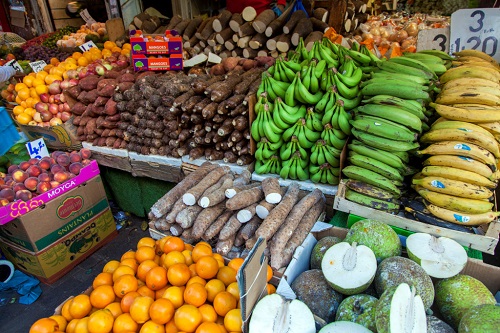The Hunger Project (THP) an organization committed to the sustainable end of world hunger, has called for a comprehensive locally-led approach which addresses the complex issues that intersects with hunger to tackle global food crisis.
Some of the complex issues which intersects with hunger are identified as gender-equality, access to education, the digital divide, conflict and climate action in community development.
The Hunger Project believes that communities have the answers to the resources needed to take action to end global food crisis and that “individuals and civil society organizations need to call on governments and the private sector to allocate meaningful resources to sustainable community-led solutions.”
Mr Tim Prewitt, President and CEO of The Hunger Project (THP), in a media engagement after the launch of the 2022 SOFI report, called for a shift in global focus toward strengthening resilience in rural communities.
Particularly among small-scale food producers who were responsible for feeding millions of people in Africa, South Asia, and Latin America and who were most impacted by shocks to global food systems.
“It’s time to invest in these producers and women in particular to ensure that they are able to increase their crop yields, while preserving the natural environment for future generations,” he added.
He noted that the SOFI report, “has confirmed what we have been seeing in many of the communities where we work, high prices of food, seeds and fertilizers are making nutritious diets out of reach.”
Mr Rowlands Kaotcha, Vice President of Programmes for Africa and Mexico said it was clear that the systems created to feed the world were not working and therefore a need to shift mindsets around ending hunger to invest in people and in communities.
“It's time to ask ourselves if the systems created to feed our planet are working, it’s very clear they are not and so we need to shift our mindsets around ending hunger to invest in people and communities to transform these global systems that only benefit some.”
This year’s State of Food Security and Nutrition in the World (SOFI) Report, launched in July 2023 revealed that up to 783 million people around the world were living in hunger
While this remains relatively unchanged from the previous year, factors such as conflict, poverty, climate, economic shocks and covid-19 have made it unlikely to meet the 2030 Sustainable Development Goals of ending hunger.
In Africa, the SOFI report indicates that 1 in 4 people face hunger, more than double the world average, whiles the majority of the people living with chronic hunger today in the world were women as 27.8 percent of adult women face chronic food insecurity as compared to 25.4 percent of men.
Approximately 630 million people will be chronically undernourished in 2030 and nearly 148.1 million children under five years of age (22.3%) are stunted, 45 million (6.8%) face wasting, whiles 37 million (5.6%) are overweight.
The Hunger Project firmly believes that creating sustainable, interconnected systems requires full participation from those living across rural-urban communities and the SOFI report reaffirms the importance of local leadership adding “development will only be sustainable when people have the right tools and resources to lead their own development.”
The Hunger Project, a not-for profit organization has ongoing programs in Africa, Asia and Latin America where it implements programs aimed at mobilizing rural grassroots and communities to achieve sustainable progress in health, education, nutrition and family income.
In Africa the Hunger Project is active in Benin, Burkina-Faso, Ethiopia, Malawi, Mozambique, Senegal, Uganda and Ghana and in South Asia, it operates in Bangladesh and India.
Working across nine countries in Africa, the Hunger Project employs the epicentre strategy to support communities build a path to sustainable self-reliance by shifting the power to small scale producers and promoting community-led development, through a period of five to eight years.
The core philosophy of the epicentre strategy lies in three essential areas Start with women, Mobilize everyone and Engage local government and from 2008 to date, 68 epicentres have achieved self-reliance in program countries in Africa.
Latest Stories
-
Prof. Nana Aba Appiah Amfo re-appointed as Vice-Chancellor of the University of Ghana
6 minutes -
German police probe market attack security and warnings
6 minutes -
Grief and anger in Magdeburg after Christmas market attack
7 minutes -
Baltasar Coin becomes first Ghanaian meme coin to hit DEX Screener at $100K market cap
57 minutes -
EC blames re-collation of disputed results on widespread lawlessness by party supporters
1 hour -
Top 20 Ghanaian songs released in 2024
2 hours -
Beating Messi’s Inter Miami to MLS Cup feels amazing – Joseph Paintsil
2 hours -
NDC administration will reverse all ‘last-minute’ gov’t employee promotions – Asiedu Nketiah
2 hours -
Kudus sights ‘authority and kingship’ for elephant stool celebration
2 hours -
We’ll embrace cutting-edge technologies to address emerging healthcare needs – Prof. Antwi-Kusi
3 hours -
Nana Aba Anamoah, Cwesi Oteng special guests for Philip Nai and Friends’ charity event
3 hours -
Environmental protection officers receive training on how to tackle climate change
3 hours -
CLOGSAG vows to resist partisan appointments in Civil, Local Government Service
4 hours -
Peasant Farmers Association welcomes Mahama’s move to rename Agric Ministry
4 hours -
NDC grateful to chiefs, people of Bono Region -Asiedu Nketia
4 hours

